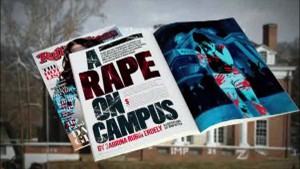Could Rolling Stone Magazine Be Found Liable for the False Rape Story?
If Sued, Will Rolling Stone Be Found Liable for the False Rape Story?
In November 2014, Rolling Stone magazine published an article titled, “A Rape on Campus,” describing the brutal gang rape of a freshman named Jackie at a Phi Kappa Psi party at the University of Virginia. As a result of the story, Greek activities on the UVA campus were suspended. Multiple protests of Greek life were held on the UVA campus criticizing the initiation and pledging process of its fraternities.
 Investigations into the case have found that the Rolling Stone story was, in fact, not truthful. Rolling Stone has since issued an apology for the story, stating that their trust in Jackie was “misplaced.”
Investigations into the case have found that the Rolling Stone story was, in fact, not truthful. Rolling Stone has since issued an apology for the story, stating that their trust in Jackie was “misplaced.”
In recent months, many have raised the question whether Phi Kappa Psi or any other fraternity with a UVA chapter could sue Rolling Stone for defamation based on the false story.
What’s Required for a Libel Lawsuit against Rolling Stone?
In order to be found liable, it must be proven that Rolling Stone had actual malice. In other words, it must be established that Rolling Stone knew that the story was materially false. Also, it must be found that the story damaged the fraternity chapter and its members.
Damages include material damages such as being displaced for the period that their fraternity house was closed resulting in hotel costs. Fraternity members could also claim damages in less tangible ways such as emotional distress.
As a result of the story, there were multiple protests throughout the campus. Protests were aimed at a “fight against this victim blaming, slut-shaming culture we have that sexualizes women, yet shames them for being sexual,” as stated in the UVA student newspaper The Cavalier Daily. Fraternity members could argue that they were wrongfully demonized as a result of the article.
While the issue of sexual assaults at fraternity parties remain the subject of intense focus, UVA fraternity members could argue that the focus switched to them specifically, as they were named in the article. The University Phi Kappa Psi President said they will consider all options, though they have not come to a decision as to whether or not they will sue.
When it comes to whether the University of Virginia could possibly sue, the answer is clear. Government entities, such as the University of Virginia, cannot sue for defamation, regardless of whether it can be proven that Rolling Stone knew the article was false when it was published.

Comments